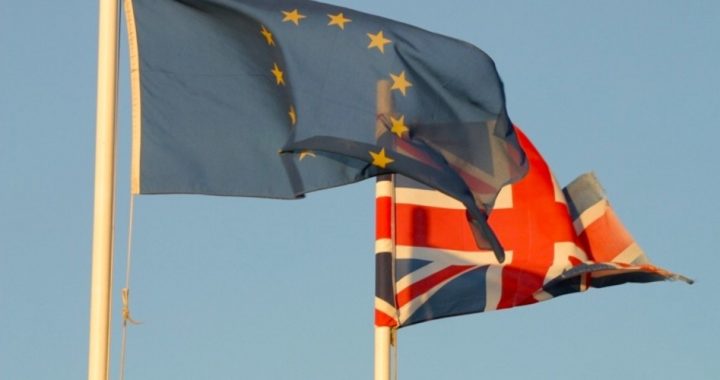
As the European Union continues to assume ever greater powers over the once-sovereign nations of the region, voters in the United Kingdom have been fed up for a while. In fact, if they were allowed to vote in a referendum, polls consistently show the U.K. would overwhelmingly opt to ditch the EU once and for all. And analysts, as well as activists on both sides of the issue, believe the day may soon come where British resistance to the emerging super-state finally prevails.
According to a German newspaper, the will of U.K. voters ultimately being fulfilled has former Prime Minister Tony Blair “deeply worried.” Meanwhile, a strategy paper by Asian banking behemoth Nomura showed that the bank is preparing for what its analysts believe is an increasingly likely scenario: British withdrawal, or at the very least, a mass repatriation of powers usurped by the Brussels-based entity.
Responding to overwhelming public pressure even from within his own party, current Prime Minister David Cameron has pretended to take a firm stance against some of the most enormous EU power grabs — more than three quarters of the laws in Europe now come from the EU. Most recently in December, his government rejected a massive European “fiscal treaty” that would have further centralized taxation and spending authority in Brussels.
Like several other U.K. political leaders, Cameron campaigned on a platform of allowing voters to decide the nation’s future relationship with the expanding EU super-state. Indeed, the promises likely played a crucial role in bringing him to power in the first place. Once Cameron became Prime Minister, however, he refused to allow a referendum.
Last month, facing dissenters even among leaders in his own conservative party — not to mention the surge to prominence of anti-EU political parties such as the U.K. Independence Party that threaten the ruling political class — Cameron reluctantly agreed to possibly consider allowing a referendum at some point in the future. Or not. Most of his statements were typical political pandering with no concrete pledges.
“There are those who argue for an in-out referendum now. I don’t agree with that because I don’t believe leaving the EU would be best for Britain. Nor do I believe that voting to preserve the exact status quo would be right either,” Cameron recently told members of Parliament, trying to play both sides of the fence. “Just as I believe it would be wrong to have an immediate in-out referendum, so it would also be wrong to rule out any type of referendum for the future.”
Despite Cameron’s refusal to allow an immediate referendum — a temporary obstacle to British withdrawal at least — the prospect of letting voters decide has some establishment power brokers very nervous, considering how lopsided public sentiment against the EU now is. A recent poll by YouGov, for example, revealed that just 15 percent of the people would vote to remain in the EU as it currently stands. And analysts say the prospect of a complete British exit is increasingly probable.
According to the Nomura document, the Asian bank is drafting contingency plans for what it dubbed a “Brexit” — a British exit from the EU, along the lines of the much-touted “Grexit” that would have seen Greece ditch the single currency. “A referendum on EU membership without first securing significant concessions from EU partners would result in the UK leaving the European Union,” explained the strategy paper, written by former British diplomat and ex-Blair adviser Alastair Newton.
The bank’s analysis said that the ruling coalition made up of conservatives and the largely pro-EU liberal democrats was in danger of breaking apart, too. If that were to happen — and it appears increasingly probable — a new election would be held, which would be “followed, irrespective of the outcome, by a referendum.” That would, of course, result in the U.K. leaving the EU unless Brussels agreed to massive concessions, an unlikely prospect.
In an interview with Die Zeit, former Prime Minister Blair pointed out the obvious: The Eurozone crisis will lead to a “powerful political change” of the EU itself. Like all crises, the ongoing financial turmoil in Europe has been seized upon by advocates of bigger and more centralized government to concentrate more power in the hands of regional institutions. Even U.S. Federal Reserve boss Ben Bernanke absurdly cited the crisis — largely created by the EU and central bankers — as a reason to create a “single fiscal authority” for Europe.
But because the power grabs have been so massive and sudden, Blair, who wanted the U.K. to join the crumbling single currency before it exploded, told the German paper that he was “deeply worried that Britain could decide by referendum to leave the whole process.” Indeed, surveys consistently show that most U.K. subjects want to vote on their nation’s membership in the controversial European super-state. The polls also reveal that, if they got their wish, they would vote to ditch Brussels in an unprecedented landslide.
Blair, however, apparently thinks that if there was simply more “democratic legitimacy” — as in the largely unelected and unaccountable regional regime was perceived as less removed from the people it rules — everything would work itself out. “If more competences are transferred to the EU, then its democratic legitimacy must be built up too,” the controversial former Prime Minster was quoted as saying. “Britain must play a strong role in this because we need a balance between European institutions and the nation states.”
Having recently indicated that he would like to be “President” of “Europe” one day, Blair also urged caution as EU leaders exploit the ongoing crisis to strip the remaining vestiges of national sovereignty in the region. “If this is done wrongly, we could create a political crisis that could become just as a big as the euro crisis,” he was quoted as saying. “People will not go along with the abolishment of the nation state” — at least not if it is done all at once, a fact the establishment has long known as it sought to attack national sovereignty piece by piece.
Current Prime Minister Cameron recently told lawmakers that the first priority should be dealing with ongoing instability and the financial crisis wreaking havoc throughout the region. Then, Britain could seek to advance its “national interest” through the EU, perhaps by renegotiating some aspects and returning some of the powers seized by regional institutions to London.
“That should mean … less Europe not more Europe. Less cost, less bureaucracy, less meddling in issues that belong to nation states,” Cameron said. “It follows from my argument that far from ruling out a referendum for the future as a fresh deal in Europe becomes clear, we should consider how best to get the full consent of the British people.”
With pressure to ditch the costly, bureaucratic EU boiling over, however, a referendum may come sooner than Cameron would like. According to analysts, voters in the U.K. know their interests are not being served by allowing out-of-touch unelected bureaucrats — or “eurocrats,” as EU functionaries are known — to devour billions in British taxpayer money every year while dictating a never-ending avalanche of half-baked laws and regulations. And that will eventually have to come to an end, at least if authorities hope to maintain even a semblance of respect for the will of the people.
So-called “euro-skeptics” often point to Switzerland, which is not a member of the EU yet has among the highest GDP per capita and the lowest unemployment rates in the region. Despite tremendous bullying by European officials, Swiss voters have consistently and overwhelmingly rejected the EU. Increasingly popular political leaders in the U.K. say the tiny alpine nation is far better off because of it — and that the British people, like the rest of Europe, would benefit from a similar arrangement, too.
Related articles:
Europe Must Further Centralize Fiscal Power, Claims Fed Boss Bernanke
EU Creates “Dictatorship” Under Guise of Financial Stability
The Collectivized Train Wreck in Europe
Lisbon Treaty Builds EU Super-state
UK Leader in European Parliament Says EU on the Verge of Cataclysm



